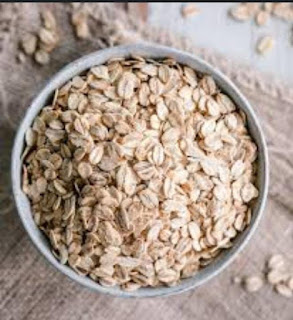Oats are more than just a delicious breakfast staple; they are a powerhouse of health benefits, especially when it comes to heart health and overall well-being. From improving blood circulation to reducing blood pressure, this humble grain is packed with essential nutrients that play a significant role in your health. If you’ve been thinking about adding more oats to your diet, here's why you should start today!
Oats: A Nutrient-Packed Superfood
Oats are an excellent source of carbohydrates and dietary fiber, including beta-glucan, a unique soluble fiber that has powerful health benefits. But oats offer much more than just fiber. They are rich in essential vitamins and minerals, including:
- Magnesium: Supports muscle and nerve function and helps maintain a healthy heart.
- Vitamin B1 (Thiamine): Essential for energy production and nervous system health.
- Vitamin B5 (Pantothenic Acid): Plays a crucial role in energy metabolism and supports skin health.
- Iron: Vital for red blood cell production and oxygen transport in the body.
- Zinc: Supports the immune system and helps with cellular repair and growth.
- Copper: Important for maintaining healthy connective tissues and bones.
These nutrients, combined with the antioxidant properties of oats, make them an excellent addition to your diet for overall health and wellness.
The Link Between Oats and Blood Circulation
One of the most notable health benefits of eating oats regularly is their ability to improve blood circulation. Oats contain a special fiber known as beta-glucan, which helps improve the flow of blood through the arteries and veins. Beta-glucan has been shown to reduce cholesterol levels, preventing plaque buildup in the blood vessels, which can lead to better circulation.
In addition, the high magnesium content in oats helps relax blood vessels, contributing to healthier blood flow and lower blood pressure. Magnesium helps balance the sodium in your body, ensuring that your blood pressure remains within a healthy range. As a result, regular consumption of oats can promote a healthier cardiovascular system and reduce the risk of heart disease.
Oats and Blood Pressure: A Natural Solution
High blood pressure (hypertension) is a common health issue that affects millions of people worldwide. Fortunately, oats can play a role in reducing blood pressure naturally. The soluble fiber in oats, particularly beta-glucan, helps to lower cholesterol and can also help manage blood pressure levels.
Studies suggest that consuming oats regularly can have a positive effect on systolic and diastolic blood pressure, making oats an ideal addition to your diet if you’re looking to manage or prevent high blood pressure. The magnesium and potassium in oats also help to regulate blood pressure by supporting proper fluid balance in the body.
Oats for Heart Health: A Heart-Healthy Choice
If you're looking to improve your heart health, oats should be at the top of your list. Research has shown that consuming oats regularly can lower both total cholesterol and LDL cholesterol (the "bad" cholesterol). Oats are one of the best food sources of beta-glucan, which helps reduce cholesterol by forming a gel-like substance in the gut that traps cholesterol and prevents it from being absorbed into the bloodstream.
By lowering cholesterol levels and reducing blood pressure, oats help reduce your risk of developing heart disease and other cardiovascular conditions. They also help with weight management by keeping you fuller for longer, preventing overeating, which can also positively impact your heart health.
Oats and Weight Management
Oats are a great food for weight management. Thanks to their high fiber content, they promote feelings of fullness and help control appetite. This can lead to better portion control and fewer calorie-dense foods in your diet. Fiber also plays a role in regulating blood sugar levels, making oats a good choice for those looking to maintain steady energy levels throughout the day.
Top FAQs About Oats:
1. How often should I eat oats for optimal health?
For the best health benefits, try to include oats in your diet at least 3-4 times a week. You can enjoy them as oatmeal, overnight oats, smoothies, or even in baked goods like muffins or cookies.
2. Can oats help lower my cholesterol?
Yes, oats contain beta-glucan, a soluble fiber that has been proven to lower LDL cholesterol. Regular consumption of oats can help reduce cholesterol levels, promoting heart health.
3. Are oats suitable for people with diabetes?
Oats can be beneficial for people with diabetes. The beta-glucan in oats helps slow down the absorption of sugar in the bloodstream, helping to maintain stable blood sugar levels.
4. Are oats gluten-free?
Oats themselves are naturally gluten-free; however, they may be processed in facilities that also handle gluten-containing grains. If you have celiac disease or gluten sensitivity, look for certified gluten-free oats.
5. Can oats help with blood pressure?
Yes, oats can help reduce blood pressure due to their magnesium content and beta-glucan fiber, both of which support healthy blood circulation and vascular function.
6. What’s the best way to prepare oats for maximum health benefits?
The healthiest way to prepare oats is to cook them with water or a plant-based milk and avoid adding too much sugar. For added flavor, consider adding fresh fruit, nuts, or seeds.
Final Thoughts
Oats are a simple, versatile, and affordable superfood that can be enjoyed in a variety of ways. Whether you're looking to improve circulation, lower blood pressure, or support your heart health, oats are a great addition to your diet. With their rich nutrient profile, including fiber, vitamins, minerals, and antioxidants, oats offer a host of benefits that can help you live a healthier life.
Start incorporating more oats into your meals today, and experience the powerful health benefits this humble grain has to offer!
By optimizing your diet with oats, you’re taking a significant step toward supporting your overall well-being. For those looking to improve heart health, blood circulation, and manage blood pressure, oats could be the superfood you’ve been looking for.


%20Foods%20That%20May%20Ease%20Your%20Pain.jpg)




%20Benefits,%20Uses,%20and%20Everything%20You%20Need%20to%20Know%20-%20Healthy%20Roots%20&%20Habits,%20Healthy%20Roots%20&%20Habits%20Blog.jpg)

%20Benefits,%20Nutrition,%20Side%20Effects,%20and%20How%20to%20Use.jpg)


No comments:
Post a Comment